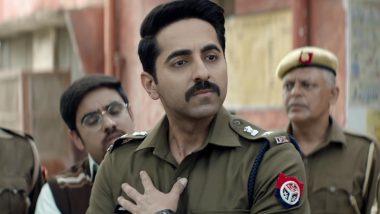Two weeks, two films, two different reasons to outrage. The storm of Kabir Singh's portrayal of alleged misogyny is still refusing to die down, and now we have a new outrage against Article 15. That too, before the release of the film. Article 15, directed by Anubhav Sinha, is a social drama that weaves an investigative thriller around incidents based on real-life. In the process, Article 15 also exposes how caste discrimination is tearing down the fabric of our society, with sections of people being suppressed in the name of lineage. Article 15 Movie Review: A Brilliantly Cast Ayushmann Khurrana Pricks Your Conscience in Anubhav Sinha’s Gripping Social Drama.
Ayushmann Khurrana plays the lead in the film, taking on the role of a righteous police officer for the first time. Article 15 also has an interesting supporting cast filled with talented actors like Manoj Pahwa, Kumud Mishra, Isha Talwar, Sayani Gupta, Mohammed Zeeshan Ayyub, Aashish Verma and Nasser.
Having watched Article 15, I can say with pride that Anubhav Sinha has crafted a film that is quite important to the current times. Unlike what certain detractors are accusing the makers, Article 15 has not vilified any religion; rather it tackles the problematic repercussions of caste dominations and how crimes are linked around it.
In this feature, we look at 7 reasons why Article 15 makes itself to be the most important film to be watched in 2019.
#1 It Acknowledges and Accepts How Deeply Entrenched Casteism Is In Our Society
Casteism is a serious issue in the country, and it is something that wouldn't be eradicated anytime in the near future. Article 15 takes an unflinching view of how it is used as a tool to suppress the lower-castes. The movie bravely depicts Dalit girls are getting raped merely for asking a little too much of what they earn for livelihood, how Dalit youths are flogged publicly for entering a temple and how the higher-caste officers think they have done a favour to the lower caste staff by giving them jobs. We can scoff and say that it only happens in certain places, but the fact that it still exists even after 79 years of the establishment of the Constitution is a matter of shame. This is exactly what Article 15 wants to highlight!
#2 The Real-Life References Don't Feel Forced
Anubhav Sinha has packed Article 15 with enough references to real-life incidents. The main crime that sets the ball rolling is reportedly based on the Badaun rape case. The flogging incident is based on the 2016 Una incident. There are other examples talked about in the film from fake encounters to Naxalism to fake PR machinery played for media that politicians use to show how 'caste' friendly they are. A passing mention of the construction of toilets everywhere is scarred by a closeup scene of a Dalit cleaning up a sewage hole in dangerous conditions. None of these references feels out of place in the film and in fact, makes the narrative even more interesting.
#3 It Works Well As a Taut Investigation Thriller
Article 15 is not just a preachy affair; the best thing about the film that it also works well as an investigation thriller. The opening scene sets the tone right; a group of Dalits singing during the rains about their conditions is intercut with one of the kidnapped girls being assaulted in a bus. The scene where the police team discovers the bodies are quite eerily captured. There are enough twists and turns in the investigation drama, that uses the social themes well in the narrative leading to one of the most heart-warming conclusions. Article 15 Movie: Shah Rukh Khan Attends the Special Screening of Ayushmann Khurrana Starrer (View Pics).
#4 Not a 'Hero'
During the film, the protagonist tells his girlfriend not to make a hero out of him. She hits back saying that people don't need a hero, they just need someone who doesn't make them feel like they need a hero. In a sense, she is pushing the responsible citizen and law-upholder in him to do his duty right. Which is why Ayan Ranjan makes for a very fascinating lead. Not a single scene does he commit any act of physical aggression. All Ayan does is stick by the book he took an oath on, and do his duty as he should. His character progression is a lesson in the sense that if every government employee, or for the matter, every citizen does their job righteously, we could make the country a more accepting society to live. Even if not the Utopia that the politicians promise us. Ayan Ranjan, the character, represents the righteousness in every one of us, who is shocked to learn that the India he is proud of, is not seen in the place he is stationed at. But he works on that righteousness, which makes him stand apart from others. Making him a hero in his own way.
#5 Where Every Aspect of the Film Gel Well
Messaging is good, but if the film doesn't work upto it, then the whole thing is a disaster. Article 15 works well, because nearly every department involved has done a fine job. Sinha's direction is stronger than most of his other efforts, and he rarely lets the film veer towards unnecessary directions. The writing is effortlessly taut, with some very hard-hitting dialogues. The performances are uniformly excellent, with special mention to Manoj Pahwa, Kumud Mishra, Mohammed Zeeshan Ayyub and Sayani Gupta. The editing is tighter here, with no distractions like songs. Article 15 may also have adopted a dark tone throughout, but it also infused with enough moments of realistic humour. Like the now famous scene, where Ayan asks the castes of his subordinates that ends in unexpected hilarity. The characters are also nicely written, and given great moments to make an impression.
#6 Is a Subtle Tribute to Both Ambedkar and Mahatma Gandhi
Article 15, as you know, is a part of the constitution, that was created by the late Babasaheb Ambedkar, who is an icon for the Dalits. The movie begins by showing a bust of Ambedkar in a village. In another scene, when Ayan enters the police station, we see the portraits of both Ambedkar and Mahatma Gandhi. During the interval scene, we get a very lingering close-up of Article 15 (with 'Vande Mataram' played in the background). While, the final scene has Gandhiji's favourite bhajan 'Vaishnava Jana' put to good use. The secular values that these two icons stood for are deteriorating in these times, but Sinha reminds us through Article 15 that they are what we need to make India united again.
#7 Dark, Yes, But Ends With A Positive Outlook
Yes, there are plenty of hard-hitting, uneasy scenes in the film, especially since most of them hit close to reality. But the writers do have hope in humanity, which strives above all. The conclusion of the film, not spoiling much here, is a perfect embodiment of why this country is so great and what makes us feel that all is not lost. And if you end up smiling and clapping at that scene, even you know that there is always light at the end of that claustrophobic tunnel.
(The above story first appeared on LatestLY on Jun 27, 2019 06:16 PM IST. For more news and updates on politics, world, sports, entertainment and lifestyle, log on to our website latestly.com).













 Quickly
Quickly


